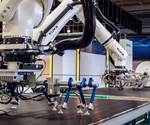Focus on automation leads to Severstal’s second investment in Airborne
Russian mining and steel firm Severstal’s $10 million investment makes Airborne the first-choice partner in Russia for all composite projects.

Source | Severstal
Mining and steel company PAO Severstal (Cherepovets, Russia) announced on June 1 that it has made a second investment tranche into Dutch company Airborne (The Hague, Netherlands), a composites fabricator involved in digital automation manufacturing. The total investment in Airborne is more than $10 million.
Despite the coronavirus pandemic crisis, which has placed many of Severstal’s global venture projects on hold, the company says it has led the new investment in Airborne with support of existing shareholders, including HPE Growth. "COVID-19 has intensified the need for automation across most industries. Where before we pursued digitalization to increase our internal efficiency levels, we are now driven by a necessity to guarantee the safety of our people, and safeguard the continuity of our production processes,” says Andrey Laptev, Severstal director of business development and corporate venture products. “Severstal has also made this investment to support entrepreneurs engaged in breakthrough technologies, and to bring promising companies to the Russian market.”
Led by Airborne’s involvement in the automotive, construction, shipbuilding, aerospace and electronics sectors, Severstal and Airborne have entered into a technology partnership agreement in Russia. Under the agreement terms, Severstal will be Airborne’s first-choice partner in Russia for the implementation of all composite projects, including the automated production of composite parts.
Related Content
-
Adaptive composite elements for building facades exhibited at JEC World 2023
University of Stuttgart institutes use carbon and glass fiber composites, robotic fabrication, biomimetic design and digial twin/control to demonstrate adaptive facade elements for future buildings.
-
Com&Sens presents workshop on fiber optic sensing for COPVs
Three-day hands-on workshop from June 11-13 in Leuven, Belgium, will equip participants with a better understanding of fiber optic sensing technology for digital manufacturing of composite tanks.
-
ST Engineering MRAS presents initiatives to drive autoclave efficiency, automation
During a JEC World 2024 panel discussion, the company revealed ways in which it is maximizing throughput and efficiency of its autoclaves and enhancing composites production processes.












